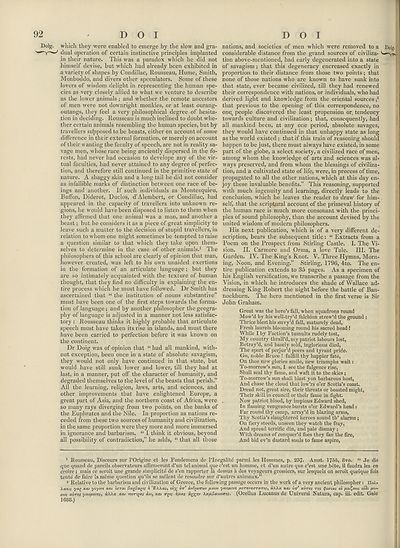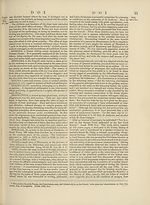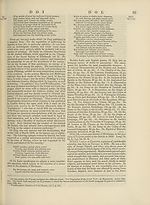Encyclopaedia Britannica > Volume 8, DIA-England
(102) Page 92
Download files
Complete book:
Individual page:
Thumbnail gallery: Grid view | List view

92 - D O I D O I
Doig. which they were enabled to emerge by the slow and gra-
dual operation of certain instinctive principles implanted
in their nature. This was a paradox which he did not
himself devise, but which had already been exhibited in
a variety of shapes by Condillac, Rousseau, Hume, Smith,
Monboddo, and divers other speculators. Some of these
lovers of wisdom delight in representing the human spe¬
cies as very closely allied to what we venture to describe
as the lower animals; and whether the remote ancestors
of men were not downright monkies, or at least ourang-
outangs, they feel a very philosophical degree of hesita¬
tion in deciding. Rousseau is much inclined to doubt whe¬
ther certain animals resembling the human species, but by
travellers supposed to be beasts, either on account of some
difference in their external formation, or merely on account
of their wanting the faculty of speech, are not in reality sa¬
vage men, whose race being anciently dispersed in the fo¬
rests, had never had occasion to develope any of the vir¬
tual faculties, had never attained to any degree of perfec¬
tion, and therefore still continued in the primitive state of
nature. A shaggy skin and a long tail he did not consider
as infallible marks of distinction between one race of be¬
ings and another. If such individuals as Montesquieu,
Buffon, Diderot, Duclos, d’Alembert, or Condillac, had
appeared in the capacity of travellers into unknown re¬
gions, he would have been disposed to listen to them when
they affirmed that one animal was a man, and another a
beast; but he considers it as a piece of great simplicity to
leave such a matter to the decision of stupid travellers, in
relation to whom one might sometimes be tempted to raise
a question similar to that which they take upon them¬
selves to determine in the case of other animals.1 The
philosophers of this school are clearly of opinion that man,
however created, was left to his own unaided exertions
in the formation of an articulate language; but they
are so intimately acquainted with the texture of human
thought, that they find no difficulty in explaining the en¬
tire process which he must have followed. Dr Smith has
ascertained that “ the institution of nouns substantive”
must have been one of the first steps towards the forma¬
tion of language ; and by another philosopher the geogra¬
phy of language is adjusted in a manner not less satisfac¬
tory : Rousseau thinks it highly probable that articulate
speech must have taken its rise in islands, and must there
have been carried to perfection before it was known on
the continent.
Dr Doig was of opinion that “ had all mankind, with¬
out exception, been once in a state of absolute savagism,
they would not only have continued in that state, but
would have still sunk lower and lower, till they had at
last, in a manner, put off the character of humanity, and
degraded themselves to the level of the beasts that perish.”
All the learning, religion, laws, arts, and sciences, and
other improvements that have enlightened Europe, a
great part of Asia, and the northern coast of Africa, were
so many rays diverging from two points, on the banks of
the Euphrates and the Nile. In proportion as nations re¬
ceded from these two sources of humanity and civilization,
in the same proportion were they more and more immersed
in ignorance and barbarism. “ I think it obvious, beyond
all possibility of contradiction,” he adds, “ that all those
nations, and societies of men which were removed to a Doig,
considerable distance from the grand sources of civiliza- ''-"y*
tion above-mentioned, had early degenerated into a state
of savagism ; that this degeneracy encreased exactly in
proportion to their distance from those two points; that
none of those nations who are known to have sunk into
that state, ever became civilized, till they had renewed
their correspondence with nations, or individuals, who had
derived light and knowledge from the oriental sources ;2
that previous to the opening of this correspondence, no
on^ people discovered the least propension or. tendency
towards culture and civilization; that, consequently, had
all mankind been, at any one period, absolute savages,
they would have continued in that unhappy state as long
as the world existed ; that if this train of reasoning should
happen to be just, there must always have existed, in some
part of the globe, a select society, a civilized race of men,
among whom the knowledge of arts and sciences was al¬
ways preserved, and from whom the blessings of civiliza¬
tion, and a cultivated state of life, were, in process of time,
propagated to all the other nations, which at this day en¬
joy these invaluable benefits.” This reasoning, supported
with much ingenuity and learning, directly leads to the
conclusion, which he leaves the reader to draw for him¬
self, that the scriptural account of the primeval history of
the human race is much more consonant with the princi¬
ples of sound philosophy, than the account devised by the
united wisdom of modern philosophers.
His next publication, which is of a very different de¬
scription, bears the subsequent title: “ Extracts from a
Poem on the Prospect from Stirling Castle. I. The Vi¬
sion. II. Carmore and Orma, a love Tale. III. The
Garden. IV. The King’s Knot. V. Three Hymns, Morn¬
ing, Noon, and Evening.” Stirling, 1796, 4to. The en¬
tire publication extends to 35 pages. As a specimen of
his English versification, we transcribe a passage from the
Vision, in which he introduces the shade of Wallace ad¬
dressing King Robert the night before the battle of Ban¬
nockburn. The hero mentioned in the first verse is Sir
John Graham.
Great was the hero’s fall, when squadrons round
Mow’d by his well-try’d falchion strew’d the ground ;
Thrice blest his envy’d fall, maturely dead,
Fresh laurels blooming round his sacred head!
While I by Faction’s tumults rudely tost,
My country thrall’d, my patriot labours lost,
Betray’d, and basely sold, inglorious died,
The sport of perjur’d peers and tyrant pride.
Go, noble Bruce ! fulfill thy happier fate,
On thee new glories smile, new triumphs wait:
To-morrow’s sun, I see the fulgence rise,
Shall seal thy fame, and waft it to the skies ;
To-morrow’s sun shall blast yon barbarous host,
And chase the cloud that low’rs o’er Scotia’s coast.
Dread not, great sire, their threats or boasted might,
Their skill in council or their fame in fight.
Now patriot blood, by impious Edward shed,
In flaming vengeance bursts o’er Edward’s head:
Far round thy camp, array’d in blazing arms,
Thy Scotia’s slaughtered heroes sound th’ alarms;
On fiery steeds, unseen they watch the fray,
And spread terrific din, and pale dismay ;
With dreams of conquer’d foes they fan the fire,
And bid ev’n dastard souls to fame aspire,
1 Rousseau, Discours sur 1’Origine et les Fondemens de ITnegalitd parmi les Hommes, p. 237- Amst. 1755, 8vo. “ Je dis
que quand de pareils observateurs affirmeront d’un tel animal que c’est un homme, et d’un autre que c’est une bete, il faudra les en
croire ; mais ce seroit une grande simplicity de s’en rapporter la dessus a des voyageurs grossiers, sur lesquels on seroit quelque this
tente' de faire la meme question qu’ils se melent de resoudre sur d’autres animaux.”
2 Relative to the barbarism and civilization of Greece, the following passage occurs in the work of a very ancient philosopher: noX-
XctKi; xoa yiyovi xa.i hrrsti fiugficcgo; ti 'EXXasj, ov% wtr’ uyfyutruv /xovov yivofclvn /xsravairrarosi ct'kXa xa.t lit' [turns rns (punas oil fta^ovos oiSs ftu-
eiios oiurns yivo/tiyns, itX'Xa xai non^ct; ocu, km v^os n/tots Xn/tlbanovrns- (Ocellus Eucanus de Universi Natura, cap. iii. edit. Gale
1688.)
Doig. which they were enabled to emerge by the slow and gra-
dual operation of certain instinctive principles implanted
in their nature. This was a paradox which he did not
himself devise, but which had already been exhibited in
a variety of shapes by Condillac, Rousseau, Hume, Smith,
Monboddo, and divers other speculators. Some of these
lovers of wisdom delight in representing the human spe¬
cies as very closely allied to what we venture to describe
as the lower animals; and whether the remote ancestors
of men were not downright monkies, or at least ourang-
outangs, they feel a very philosophical degree of hesita¬
tion in deciding. Rousseau is much inclined to doubt whe¬
ther certain animals resembling the human species, but by
travellers supposed to be beasts, either on account of some
difference in their external formation, or merely on account
of their wanting the faculty of speech, are not in reality sa¬
vage men, whose race being anciently dispersed in the fo¬
rests, had never had occasion to develope any of the vir¬
tual faculties, had never attained to any degree of perfec¬
tion, and therefore still continued in the primitive state of
nature. A shaggy skin and a long tail he did not consider
as infallible marks of distinction between one race of be¬
ings and another. If such individuals as Montesquieu,
Buffon, Diderot, Duclos, d’Alembert, or Condillac, had
appeared in the capacity of travellers into unknown re¬
gions, he would have been disposed to listen to them when
they affirmed that one animal was a man, and another a
beast; but he considers it as a piece of great simplicity to
leave such a matter to the decision of stupid travellers, in
relation to whom one might sometimes be tempted to raise
a question similar to that which they take upon them¬
selves to determine in the case of other animals.1 The
philosophers of this school are clearly of opinion that man,
however created, was left to his own unaided exertions
in the formation of an articulate language; but they
are so intimately acquainted with the texture of human
thought, that they find no difficulty in explaining the en¬
tire process which he must have followed. Dr Smith has
ascertained that “ the institution of nouns substantive”
must have been one of the first steps towards the forma¬
tion of language ; and by another philosopher the geogra¬
phy of language is adjusted in a manner not less satisfac¬
tory : Rousseau thinks it highly probable that articulate
speech must have taken its rise in islands, and must there
have been carried to perfection before it was known on
the continent.
Dr Doig was of opinion that “ had all mankind, with¬
out exception, been once in a state of absolute savagism,
they would not only have continued in that state, but
would have still sunk lower and lower, till they had at
last, in a manner, put off the character of humanity, and
degraded themselves to the level of the beasts that perish.”
All the learning, religion, laws, arts, and sciences, and
other improvements that have enlightened Europe, a
great part of Asia, and the northern coast of Africa, were
so many rays diverging from two points, on the banks of
the Euphrates and the Nile. In proportion as nations re¬
ceded from these two sources of humanity and civilization,
in the same proportion were they more and more immersed
in ignorance and barbarism. “ I think it obvious, beyond
all possibility of contradiction,” he adds, “ that all those
nations, and societies of men which were removed to a Doig,
considerable distance from the grand sources of civiliza- ''-"y*
tion above-mentioned, had early degenerated into a state
of savagism ; that this degeneracy encreased exactly in
proportion to their distance from those two points; that
none of those nations who are known to have sunk into
that state, ever became civilized, till they had renewed
their correspondence with nations, or individuals, who had
derived light and knowledge from the oriental sources ;2
that previous to the opening of this correspondence, no
on^ people discovered the least propension or. tendency
towards culture and civilization; that, consequently, had
all mankind been, at any one period, absolute savages,
they would have continued in that unhappy state as long
as the world existed ; that if this train of reasoning should
happen to be just, there must always have existed, in some
part of the globe, a select society, a civilized race of men,
among whom the knowledge of arts and sciences was al¬
ways preserved, and from whom the blessings of civiliza¬
tion, and a cultivated state of life, were, in process of time,
propagated to all the other nations, which at this day en¬
joy these invaluable benefits.” This reasoning, supported
with much ingenuity and learning, directly leads to the
conclusion, which he leaves the reader to draw for him¬
self, that the scriptural account of the primeval history of
the human race is much more consonant with the princi¬
ples of sound philosophy, than the account devised by the
united wisdom of modern philosophers.
His next publication, which is of a very different de¬
scription, bears the subsequent title: “ Extracts from a
Poem on the Prospect from Stirling Castle. I. The Vi¬
sion. II. Carmore and Orma, a love Tale. III. The
Garden. IV. The King’s Knot. V. Three Hymns, Morn¬
ing, Noon, and Evening.” Stirling, 1796, 4to. The en¬
tire publication extends to 35 pages. As a specimen of
his English versification, we transcribe a passage from the
Vision, in which he introduces the shade of Wallace ad¬
dressing King Robert the night before the battle of Ban¬
nockburn. The hero mentioned in the first verse is Sir
John Graham.
Great was the hero’s fall, when squadrons round
Mow’d by his well-try’d falchion strew’d the ground ;
Thrice blest his envy’d fall, maturely dead,
Fresh laurels blooming round his sacred head!
While I by Faction’s tumults rudely tost,
My country thrall’d, my patriot labours lost,
Betray’d, and basely sold, inglorious died,
The sport of perjur’d peers and tyrant pride.
Go, noble Bruce ! fulfill thy happier fate,
On thee new glories smile, new triumphs wait:
To-morrow’s sun, I see the fulgence rise,
Shall seal thy fame, and waft it to the skies ;
To-morrow’s sun shall blast yon barbarous host,
And chase the cloud that low’rs o’er Scotia’s coast.
Dread not, great sire, their threats or boasted might,
Their skill in council or their fame in fight.
Now patriot blood, by impious Edward shed,
In flaming vengeance bursts o’er Edward’s head:
Far round thy camp, array’d in blazing arms,
Thy Scotia’s slaughtered heroes sound th’ alarms;
On fiery steeds, unseen they watch the fray,
And spread terrific din, and pale dismay ;
With dreams of conquer’d foes they fan the fire,
And bid ev’n dastard souls to fame aspire,
1 Rousseau, Discours sur 1’Origine et les Fondemens de ITnegalitd parmi les Hommes, p. 237- Amst. 1755, 8vo. “ Je dis
que quand de pareils observateurs affirmeront d’un tel animal que c’est un homme, et d’un autre que c’est une bete, il faudra les en
croire ; mais ce seroit une grande simplicity de s’en rapporter la dessus a des voyageurs grossiers, sur lesquels on seroit quelque this
tente' de faire la meme question qu’ils se melent de resoudre sur d’autres animaux.”
2 Relative to the barbarism and civilization of Greece, the following passage occurs in the work of a very ancient philosopher: noX-
XctKi; xoa yiyovi xa.i hrrsti fiugficcgo; ti 'EXXasj, ov% wtr’ uyfyutruv /xovov yivofclvn /xsravairrarosi ct'kXa xa.t lit' [turns rns (punas oil fta^ovos oiSs ftu-
eiios oiurns yivo/tiyns, itX'Xa xai non^ct; ocu, km v^os n/tots Xn/tlbanovrns- (Ocellus Eucanus de Universi Natura, cap. iii. edit. Gale
1688.)
Set display mode to:
![]() Universal Viewer |
Universal Viewer | ![]() Mirador |
Large image | Transcription
Mirador |
Large image | Transcription
Images and transcriptions on this page, including medium image downloads, may be used under the Creative Commons Attribution 4.0 International Licence unless otherwise stated. ![]()
| Encyclopaedia Britannica > Encyclopaedia Britannica > Volume 8, DIA-England > (102) Page 92 |
|---|
| Permanent URL | https://digital.nls.uk/193324331 |
|---|
| Attribution and copyright: |
|
|---|
| Description | Ten editions of 'Encyclopaedia Britannica', issued from 1768-1903, in 231 volumes. Originally issued in 100 weekly parts (3 volumes) between 1768 and 1771 by publishers: Colin Macfarquhar and Andrew Bell (Edinburgh); editor: William Smellie: engraver: Andrew Bell. Expanded editions in the 19th century featured more volumes and contributions from leading experts in their fields. Managed and published in Edinburgh up to the 9th edition (25 volumes, from 1875-1889); the 10th edition (1902-1903) re-issued the 9th edition, with 11 supplementary volumes. |
|---|---|
| Additional NLS resources: |
|

